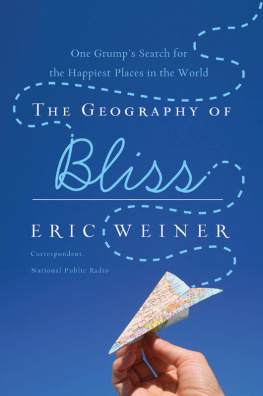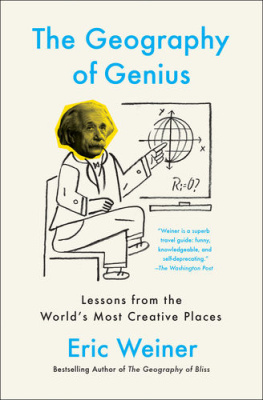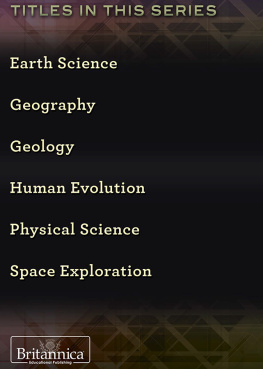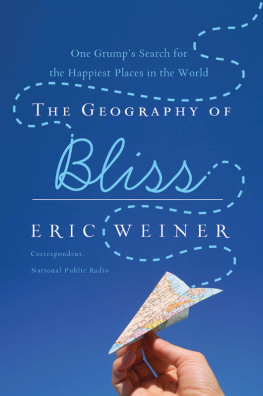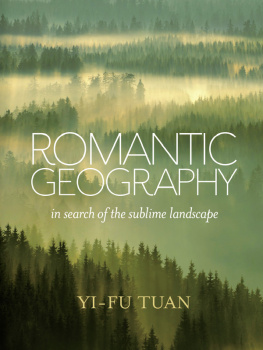Eric Weiner - The Geography of Bliss: One Grumps Search for the Happiest Places in the World
Here you can read online Eric Weiner - The Geography of Bliss: One Grumps Search for the Happiest Places in the World full text of the book (entire story) in english for free. Download pdf and epub, get meaning, cover and reviews about this ebook. year: 2008, publisher: Twelve, genre: Art. Description of the work, (preface) as well as reviews are available. Best literature library LitArk.com created for fans of good reading and offers a wide selection of genres:
Romance novel
Science fiction
Adventure
Detective
Science
History
Home and family
Prose
Art
Politics
Computer
Non-fiction
Religion
Business
Children
Humor
Choose a favorite category and find really read worthwhile books. Enjoy immersion in the world of imagination, feel the emotions of the characters or learn something new for yourself, make an fascinating discovery.
- Book:The Geography of Bliss: One Grumps Search for the Happiest Places in the World
- Author:
- Publisher:Twelve
- Genre:
- Year:2008
- Rating:5 / 5
- Favourites:Add to favourites
- Your mark:
- 100
- 1
- 2
- 3
- 4
- 5
The Geography of Bliss: One Grumps Search for the Happiest Places in the World: summary, description and annotation
We offer to read an annotation, description, summary or preface (depends on what the author of the book "The Geography of Bliss: One Grumps Search for the Happiest Places in the World" wrote himself). If you haven't found the necessary information about the book — write in the comments, we will try to find it.
Eric Weiner: author's other books
Who wrote The Geography of Bliss: One Grumps Search for the Happiest Places in the World? Find out the surname, the name of the author of the book and a list of all author's works by series.
The Geography of Bliss: One Grumps Search for the Happiest Places in the World — read online for free the complete book (whole text) full work
Below is the text of the book, divided by pages. System saving the place of the last page read, allows you to conveniently read the book "The Geography of Bliss: One Grumps Search for the Happiest Places in the World" online for free, without having to search again every time where you left off. Put a bookmark, and you can go to the page where you finished reading at any time.
Font size:
Interval:
Bookmark:
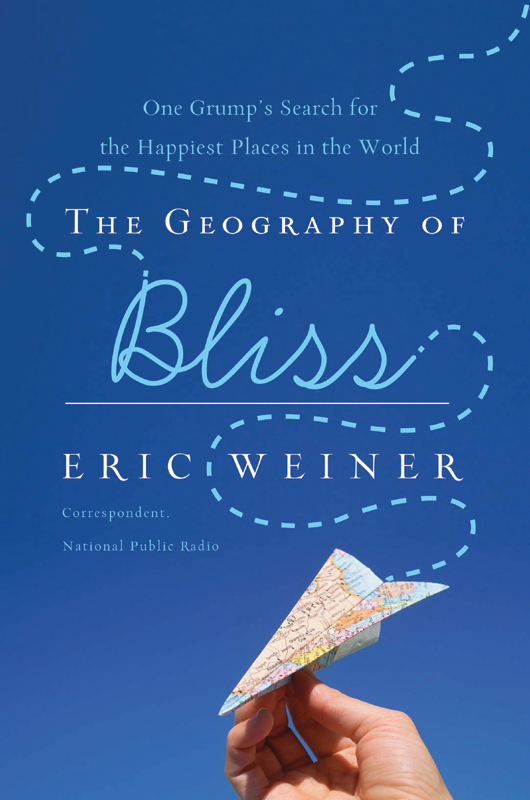
Copyright 2008 by Eric Weiner
All rights reserved. Except as permitted under the U.S. Copyright Act of 1976, no part of this publication may be reproduced, distributed, or transmitted in any form or by any means, or stored in a database or retrieval system, without the prior written permission of the publisher.
Twelve
Hachette Book Group
237 Park Avenue
New York, NY 10017
Visit our Web site at www.HachetteBookGroup.com.
Twelve is an imprint of Grand Central Publishing.
The Twelve name and logo is a trademark of Hachette Book Group, Inc.
First eBook Edition: January 2008
ISBN-13: 978-0-446-51107-0
for Sharon
In these days of wars and rumors of wars, havent you ever dreamed of a place where there was peace and security, where living was not a struggle but a lasting delight?
Lost Horizon, directed by Frank Capra, 1937
M y bags were packed and my provisions loaded. I was ready for adventure. And so, on a late summer afternoon, I dragged my reluctant friend Drew off to explore new worlds and, I hoped, to find some happiness along the way. Ive always believed that happiness is just around the corner. The trick is finding the right corner.
Not long into our journey, Drew grew nervous. He pleaded with me to turn back, but I insisted we press on, propelled by an irresistible curiosity about what lay ahead. Danger? Magic? I needed to know, and to this day Im convinced I would have reached wherever it was I was trying to reach had the Baltimore County Police not concluded, impulsively I thought at the time, that the shoulder of a major thoroughfare was no place for a couple of five-year-olds.
Some people acquire the travel bug. Others are born with it. My affliction, if thats what it is, went into remission for many years following my aborted expedition with Drew. It resurfaced after college with renewed fury. I desperately wanted to see the world, preferably on someone elses dime. But how? I had no marketable skills, a stunted sense of morality, and a gloomy disposition. I decided to become a journalist.
As a foreign correspondent for National Public Radio, I traveled to places such as Iraq, Afghanistan, and Indonesia: unhappy places. On one level, this made perfect sense. Unconsciously, I was observing the first law of writing: Write about what you know. And so, notebook in hand, tape recorder slung over my shoulder, I roamed the world telling the stories of gloomy, unhappy people. The truth is that unhappy people, living in profoundly unhappy places, make for good stories. They tug at heartstrings and inspire pathos.
They can also be a real bummer.
What if, I wondered, I spent a year traveling the globe, seeking out not the worlds well-trodden trouble spots but, rather, its unheralded happy places? Places that possess, in spades, one or more of the ingredients that we consider essential to the hearty stew of happiness: money, pleasure, spirituality, family, and chocolate, among others. Around the world, dozens of what-ifs play themselves out every day. What if you lived in a country that was fabulously wealthy and no one paid taxes? What if you lived in a country where failure is an option? What if you lived in a country so democratic that you voted seven times a year? What if you lived in a country where excessive thinking is discouraged? Would you be happy then?
Thats exactly what I intended to find out, and the result of this admittedly harebrained experiment is the book you now hold in your hands.
I was born in the Year of the Smiley Face: 1963. Thats when a graphic designer from Worcester, Massachusetts, named Harvey Ball invented the now-ubiquitous grinning yellow graphic. Originally, Balls creation was designed to cheer up people who worked at, of all places, an insurance company, but it has since become synonymous with the frothy, quintessentially American brand of happiness.
Balls cheery icon never worked its magic on me. I am not a happy person, never have been. As a child, my favorite Winnie-the-Pooh character was Eeyore. For most of human history, I would have been considered normal. Happiness, in this life, on this earth, was a prize reserved for the gods and the fortunate few. Today, though, not only is happiness considered possible for anyone to attain, it is expected. Thus I, and millions of others, suffer from the uniquely modern malady that historian Darrin McMahon calls the unhappiness of not being happy. It is no fun at all.
And so, like many others, Ive worked at it. I never met a self-help book I didnt like. My bookshelf is a towering, teetering monument to existential angst, brimming with books informing me that happiness lies deep inside of me. If Im not happy, they counsel, then Im not digging deep enough.
This axiom of the self-help industrial complex is so deeply ingrained as to be self-evident. Theres only one problem: Its not true. Happiness is not inside of us but out there. Or, to be more precise, the line between out there and in here is not as sharply defined as we think.
The late British-born philosopher Alan Watts, in one of his wonderful lectures on eastern philosophy, used this analogy: If I draw a circle, most people, when asked what I have drawn, will say I have drawn a circle or a disc, or a ball. Very few people will say Ive drawn a hole in the wall, because most people think of the inside first, rather than thinking of the outside. But actually these two sides go togetheryou cannot have what is in here unless you have what is out there.
In other words, where we are is vital to who we are.
By where, Im speaking not only of our physical environment but also of our cultural environment. Culture is the sea we swim inso pervasive, so all-consuming, that we fail to notice its existence until we step out of it. It matters more than we think.
With our words, we subconsciously conflate geography and happiness. We speak of searching for happiness, of finding contentment, as if these were locations in an atlas, actual places that we could visit if only we had the proper map and the right navigational skills. Anyone who has taken a vacation to, say, some Caribbean island and had flash through their mind the uninvited thought I could be happy here knows what I mean.
Lurking just behind the curtain is, of course, that tantalizing, slippery concept known as paradise. It has beguiled us humans for some time now. Plato imagined the Blessed Isles, a place where happiness flowed like the warm Mediterranean waters. Until the eighteenth century, people believed that biblical paradise, the Garden of Eden, was a real place. It appeared on mapslocated, ironically, at the confluence of the Tigris and Euphrates rivers, in what is now modern-day Iraq.
European explorers prepared for expeditions in search of paradise by learning Aramaic, the language Jesus spoke. I set out on my journey, my search for paradise, speaking not Aramaic but another obscure language, the modern liturgy of bliss spoken by the new apostles of the emerging science of happiness. I brush up on terms like positive affect and hedonic adaptation. I carry no Bible, just a few Lonely Planet guides and a conviction that, as Henry Miller said, Ones destination is never a place, but a new way of seeing things.
And so, on a typically steamy day in Miami (itself some peoples concept of paradise), I pack my bags and depart my home on what I know full well is a fools errand, every bit as foolish as the one I tried to pull off as a peripatetic five-year-old. As the author Eric Hoffer put it, The search for happiness is one of the chief sources of unhappiness. Thats okay. Im already unhappy. I have nothing to lose.
Font size:
Interval:
Bookmark:
Similar books «The Geography of Bliss: One Grumps Search for the Happiest Places in the World»
Look at similar books to The Geography of Bliss: One Grumps Search for the Happiest Places in the World. We have selected literature similar in name and meaning in the hope of providing readers with more options to find new, interesting, not yet read works.
Discussion, reviews of the book The Geography of Bliss: One Grumps Search for the Happiest Places in the World and just readers' own opinions. Leave your comments, write what you think about the work, its meaning or the main characters. Specify what exactly you liked and what you didn't like, and why you think so.

